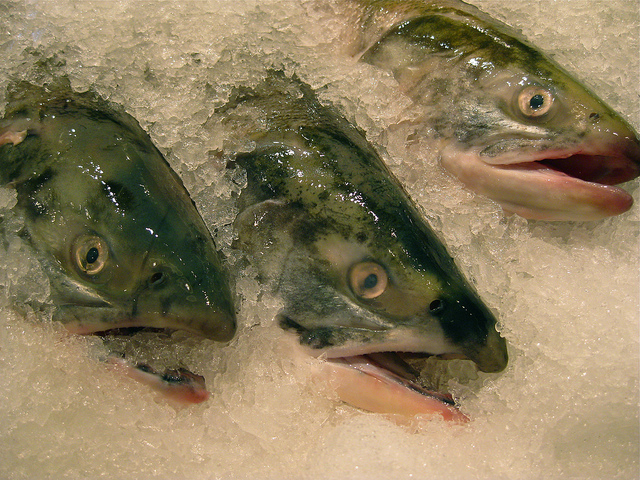Joyce Nelson investigates the Harper government’s proposed regulatory changes to the Fisheries Act and its impacts on the environment and health in the two-part series on the fish-farm industry.
Read part two ‘Fish farm madness: Why does industry receive preference under Fisheries Act?‘
In its proposed regulatory changes to the Fisheries Act, the Harper government is not only catering to the Norwegian-based multinational fish-farm industry in Canada, it is also collaborating with the U.S. government in little-known efforts to “harmonize” regulations across many sectors, including the aquaculture industry.
The results could have devastating impacts on Canada’s ocean environment, wild fish, and our fishing industries.
Now a large coalition of businesses, fishing associations, scientists and environmentalists is calling upon Prime Minister Stephen Harper to stop proposed changes to federal aquaculture regulations, saying the changes would damage the environment and existing businesses. The Harper government is proposing to amend the federal Fisheries Act, exempting the fish-farm industry from provisions that “prohibit the release of deleterious substances into water frequented by fish.”
In an Open Letter to PM Harper dated February 17, the 120 signatories from across Canada state that “the proposed changes, if enacted, will lead to the discharge of increasingly powerful pesticides and other potentially damaging substances into the ecosystem, significantly reduce government regulatory oversight, and damage Canada’s commercial interests as a provider of untainted seafood.”
The multinational fish-farm industry has been lobbying for the Canadian regulatory changes since 2011.
The Open Letter signatories include more than 60 scientists such as B.C. independent biologist Alexandra Morton and Dalhousie University professor of biology Jeffrey Hutchings, as well as representatives from the United Fishermen and Allied Workers Union-Unifor, and many fishing associations.
The day the Open Letter was released, the Harper government announced that it will issue multi-year licences for fish-farms in B.C. in order to promote investment in the industry.
Lethal effects
The aquaculture industry already uses significant amounts of pesticides and drugs to stave off sea-lice infestations and other maladies, but it wants the regulatory changes in order to use even stronger pesticides, more drug treatments and other potentially “deleterious” substances.
However, recent studies show that two of the desired pesticides — Salmosan and AlphaMax (both trademarked) — can have lethal effects on lobsters and other wild marine species hundreds of metres distant from a fish-farm.
As a result of these studies, numerous fisheries associations have signed onto the Open Letter, including the Fundy North Fishermen’s Association, the Nova Scotia Salmon Association, Federation quebecoise pour le saumon atlantique, the Maritime Fishermen’s Union, the Eastern Shore Fishermen’s Protective Association, the Grand Manan Fishermen’s Association and others.
The Open Letter further states that as a consequence of the proposed changes:
“Environment Canada’s role would be eliminated, leaving reliance upon Health Canada and the Department of Fisheries and Oceans (DFO) to ensure environmental protection. Health Canada does not have an undivided environmental protection mandate and DFO does not have the capacity to undertake the surveillance work of Environment Canada.”
Hundreds of scientists and other professionals’ jobs have been eliminated from the DFO by the Harper government in recent years during its War on Science.
In a startling passage, the Open Letter also states:
“The environmental risk assessments currently performed by Health Canada for pesticide impacts are conducted in a manner that is less than transparent based upon proprietary data sets provided by chemical manufacturers. In the case of drugs, the environmental assessments are negligible and Health Canada does not conduct any subsequent environmental impacts monitoring after these same products are put into commercial usage.”
The Pest Management Regulatory Agency (PMRA) — the division of Health Canada that regulates all pesticides — has lost more than 100 biologists and other professional personnel during Harper’s prolonged War on Science. Critics say the PMRA now basically and routinely accepts the pesticide manufacturer’s input regarding the safety of their products, without further investigation.
Stewart Lamont, managing director of Tangier Lobster in Nova Scotia, told the Chronicle Herald that increased usage of the pesticides, which have killed hundreds of lobsters in previous years, “poses a substantial threat to the wild fishery.”
Bill Ernst, a retired Environment Canada toxicologist, says the proposed regulations “will set back Canadian aquatic environmental protection measures several decades.” Ernst told me by email that the sea-lice pesticide AlphaMax is now made by Pharmaq, “but it seems Salmosan went from Novartis to a company called Fish Health Group.”
Pharmaq is now owned by a UK-based private equity firm called Permira — an indication of the wide range of business interests that are now concentrating on aquaculture as the next big investment opportunity across North America.
As we shall see, Canada and the U.S. have been busily (and quietly) coordinating regulations to ease that development.
Joyce Nelson is an award-winning freelance writer/researcher and the author of five books.
Photo: flickr/ Paul Miller




